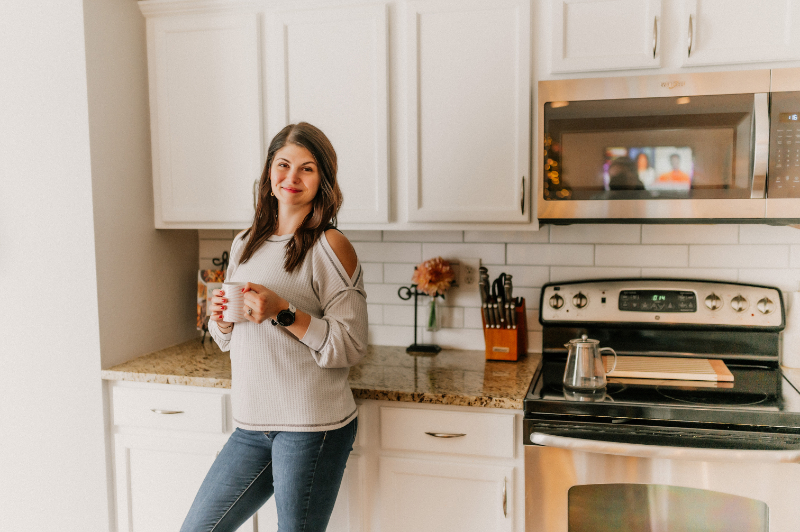The Science Behind Affirmations: How Positive Statements Rewire the Anxious Brain
January 7, 2025
When you hear the word “affirmations,” what comes to mind? For many, it’s sticky notes on the mirror with phrases like “I am enough” or “I can handle anything.” And so hear me when I tell you, that while affirmations may sound like feel-good fluff, there’s actually solid science behind affirmations (and yes, I’ll get into the details because it’s super fascinating).
As someone who’s worked with OCD and anxiety for years, I’ve also seen firsthand how affirmations can help rewire the brain and build resilience against anxious thinking.
Let’s talk about it.

WHAT ARE AFFIRMATIONS?
Affirmations are short, positive statements you repeat to yourself to challenge negative or unhelpful thoughts. They might seem simple, but the real power comes from consistency and intention (just saying something once in the mirror probably won’t cut it—more on that later).
Think of affirmations as mental reps at the gym. You wouldn’t expect to get stronger by lifting a weight once, right? Similarly, affirmations work by reinforcing new, healthier thought patterns in your brain over time.
THE NEUROSCIENCE OF AFFIRMATIONS
Here’s where the science behind affirmations gets really interesting. Our brains have something called neuroplasticity, which is the ability to create new neural pathways and rewire old ones. This means your brain is constantly changing and adapting based on what you think, say, and do.
When you repeat affirmations, you’re engaging a part of your brain called the ventromedial prefrontal cortex. Research shows this region is involved in self-referential processing—basically, how you see yourself. (Cool, right?) By repeating positive statements, you’re training your brain to focus more on positive self-beliefs and less on the negative stories anxiety likes to tell us.
And here’s the kicker: Your brain doesn’t fully distinguish between reality and imagination. So, when you say affirmations like “I am calm and capable,” your brain starts to believe it’s true, even if you’re not feeling that way yet. It’s like planting seeds that grow over time.
HOW AFFIRMATIONS HELP ANXIETY AND OCD
As someone who’s supported countless clients with anxiety and OCD (and been in the trenches myself), I can tell you that the science behind affirmations shows they can be a real game-changer. They’re not a magic wand, we don’t believe in those around here, but they are a powerful tool in your toolkit.
For anxiety, affirmations work by reducing the brain’s hyperfocus on threats and calming the fight-or-flight response. When anxiety flares up, your brain often fixates on worst-case scenarios. Repeating affirmations like “I can handle uncertainty” helps shift your focus and teaches your brain to tolerate discomfort without spiraling.
For OCD, affirmations can support exposure and response prevention (ERP) therapy. For example, if you’re doing ERP for contamination fears, affirmations like “I can sit with this discomfort and grow stronger” can help reinforce the work you’re doing and build confidence in your ability to manage intrusive thoughts.
I know it’s hard to believe affirmations can make a difference when your brain is stuck in a loop of fear or doubt. (Been there.) But trust me: With practice, they can help you create a little space between you and your anxious thoughts. And sometimes, that space is all you need to break free.

TIPS FOR CRAFTING AND USING AFFIRMATIONS
Affirmations aren’t one-size-fits-all. To make them work for you, it’s important to create statements that feel realistic and relevant to your situation. Here are a few tips:
- Focus on what you want to believe, not what you’re trying to avoid. For example, instead of saying “I’m not anxious,” try “I am calm and grounded.”
- Use “I” statements that resonate with you. This helps your brain process the affirmation as self-relevant.
- Broad affirmations like “I am amazing” might feel empty. Instead, try something more targeted, like “I have the skills to handle today’s challenges.”
- Consistency is key. I recommend saying your affirmations out loud (if you’re comfortable) every morning or writing them down in a journal.
- Affirmations are most effective when paired with action. If you’re saying “I am confident,” look for small ways to act confidently throughout your day, like speaking up in a meeting or setting a boundary.
I’ll be honest: Affirmations might feel awkward at first. (I’ve had plenty of clients laugh or roll their eyes during this process!) That’s okay. The important thing is to stick with it and trust the process.
WHAT DOES RESEARCH SAY ABOUT AFFIRMATIONS?
If you’re like me, you probably want to know the science behind affirmations—the evidence that supports these feel-good phrases (because let’s be honest, theory only goes so far). Turns out, there’s solid evidence that affirmations can make a real difference.
For example, one study found that self-affirmations activate brain regions associated with reward and positive valuation, including the ventromedial prefrontal cortex (the part I mentioned earlier). This suggests that affirmations can help us process and integrate positive self-beliefs, even in the face of challenges.
Another fascinating study showed that affirmations can improve problem-solving under stress. Researchers found that participants who practiced self-affirmations before a stressful task performed better and were less likely to feel overwhelmed. This ties into why affirmations are so helpful for anxiety—they reduce your brain’s reactivity to stress and help you approach situations with more clarity and confidence.
For people dealing with OCD, affirmations may not directly stop intrusive thoughts, but they can support the mindset needed to engage in exposure therapy. For example, affirmations like “I can face my fears and grow stronger” can help build the resilience and determination needed to sit with discomfort during exposures.
At the end of the day, while affirmations won’t replace therapy or other evidence-based treatments, the research makes it clear: They’re a valuable tool that can complement your mental health journey.

WRAPPING IT UP: THE SCIENCE BEHIND AFFIRMATIONS
The science behind affirmations is clear: They can rewire your brain, reduce anxiety, and help you build resilience. While they’re not a cure-all, they’re a powerful tool that complements other strategies like ERP, mindfulness, and therapy.
If you’re new to affirmations, I encourage you to start small. Pick one or two statements that resonate with you, and commit to practicing them daily. Remember, change takes time—so be patient with yourself (and give yourself credit for every small step you take).
What I want you to know more than anything is that you are capable of amazing things, and your brain is more adaptable than you realize. With the right tools, you can rewire your thoughts and create a calmer, more confident version of yourself.
If you’re ready to take the next step in your journey, I’ve got plenty of tools to support you. Check out my Break Free Action Cards to help you incorporate affirmations and actionable strategies into your daily routine. For more tips, real talk, and guidance, tune into my podcast, All the Hard Things—your go-to for practical advice and encouragement. You can also explore my courses, like the OCD and Anxiety Recovery Blueprint, to dive deeper into recovery strategies.
And don’t forget to follow me on Instagram for daily support and inspiration. Remember, it’s okay to start small—whether it’s one affirmation, one podcast episode, or one course, you’re already taking a step in the right direction!
most popular episodes
Love my podcast?
Episode 112: Postpartum OCD and False Memory OCD
Imagine how in depth I can go in an online course. Instantly downloadable and game-changing. Take the next step towards an amazing life.